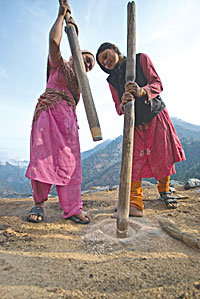 SAM KANG LI |
Feudal and patriarchal Nepali society did not take kindly to women fighting to change the nation. Over recent years women activists, campaigners and soldiers faced criticism from society, and were jailed, disappeared and tortured.
Still, they refused to give up because they were fighting for equality of class, ethnicity, region and gender. The movement, initially limited to a few districts, spread to all 75. It brought all women together and made them aware of their situation. The fight was not for a few privileged women, but for rural women who had been oppressed
for years.
Full women's rights have still not been achieved yet. It is time to evaluate the past and assess the present position of the movement in order to move ahead. Some leaders still have an old-fashioned attitude towards women. They appear to support them, but then doubt their capability in times of crisis.
Women proved their capability during the interim government, and played a vital role in bringing about a republic. Some people try to belittle their role, but these claims are based on personal agendas and prejudices.
Women's presence in the assembly is historic. We can not underestimate their capability, as they have already contributed much to the democratic movement. Women are not lacking in competence or unaware of the issues to be raised in the assembly. At present, their role is to write a new constitution, implement the republic and guarantee women's rights. We must move ahead with the belief that men and women representatives have the same roles in nation-building.


